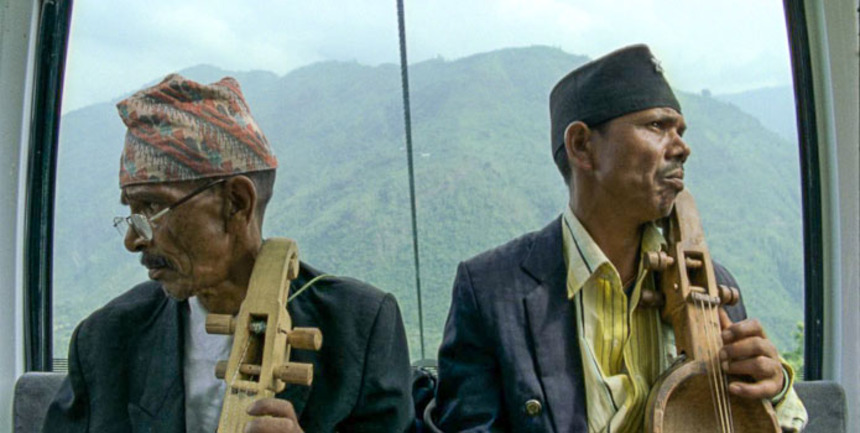TIFF 2013 Review: MANAKAMANA Transcends The Simplicity Of Its Journey

Two elderly women sit in a gondola while it travels down a verdant Nepalese mountain. Having visited the Manakamana temple earlier in the day, they have purchased ice cream on a stick for the ride down and it is melting in the hot interior of the cable car. They laugh and carry on, unguardedly about the futility of neatly consuming the frozen dessert. The simple joy might be the single best scene seen in film all year. It's certainly the warmest. How else would this image be possible without Stephanie Spray and Pacho Velez's super-16mm camera (presumably travelling without an operator) sitting on the opposite bench in the car? They allow us to stare without being impolite or influencing the experience in the Heisenbergian sense. This kind of commitment; the mundane as profound, intimate yet knowing little, makes the experience rich beyond explaining the nuts and bolts of what the film is. While watching I got that special kind of tingle when something truly transportive is happening on the screen in front of me.
Extraordinarily simple in execution, the film Manakamana consists of 11 of these 11-minute-long cable car rides; 5 up the mountain and 6 down. Splices are provided by the darkness of the cable-stations at either end of the trip. We only see one couple make both journeys. Another ride is an open car filled with goats, shipped up for sacrifice, possibly. The etymology of the temple name comes from "heart" and "wish" and indeed wishes are said to be granted by the Goddess Bhagwati to all those who make the lengthy pilgrimage up the mountain, although it is now facilitated with a state of the art tram which cost about $5 for a two way trek.
The riders range from single women in floral print saris to a pair of musicians casually tuning their instruments. Two young Nepalese teenagers take pictures and video with their identical digital cameras. A couple go up with a rooster in their lap (we will also see them go down with a dead rooster.) A young American woman scrawls in her moleskin notebook (as I make a note of that in mine, meta, that...) while discussing diaries and analog photography with her companion for the passage down.
The film postulates, if you allow me to sound corny, that the journey holds higher value than the destination, at least for the people-watching aspect. With the 10 minute plus unbroken takes, we are indeed looking at faces, listening to small talk, observing body language; whether it is due to the camera or anxiety or excitement of the impending temple visit (or the glow of the aftermath), is unclear. It is all against the stunning backdrop of Nepal's Trisuli Valley with its smatter of tiny houses and sal trees. The soundtrack is the grind of the cables, particularly at the moments when it goes over a tower. You see the flinch in most of the riders at this noise; particularly the goats. Curiously, even for us passive observers, the trip to the top seems to take longer than the voyage back to the bottom. Thus making the film about time and perception as much as it is about modern Nepalese culture and the passing of time.
This is the second film project issued Harvard's Sensory Ethnography Lab. Last year they issued one of my favourite experiences on the festival circuit, Leviathan -- a wordless birds-eye, fish-eye and people-eye view on a commercial fishing vessel. The lab is now two for two with this film which is less nausea or sleep inducing; more stately, and more meditative. Both are enveloping and compelling viewing. Like the wonderful ladies riding down the mountain, the film, beyond capturing their images, seems to say, "Life zips along so fast in smooth stretches and bumps, rises and dips, it is wet and messy and often hard to savour. Let it drip to the floor. Laugh. Enjoy." Manakamana is a unique and fulfilling cinematic experience -- and one of the best of the year.
Manakamana
Director(s)
- Stephanie Spray
- Pacho Velez
Cast
- Chabbi Lal Gandharba
- Anish Gandharba
- Bindu Gayek
- Narayan Gayek

Do you feel this content is inappropriate or infringes upon your rights? Click here to report it, or see our DMCA policy.






